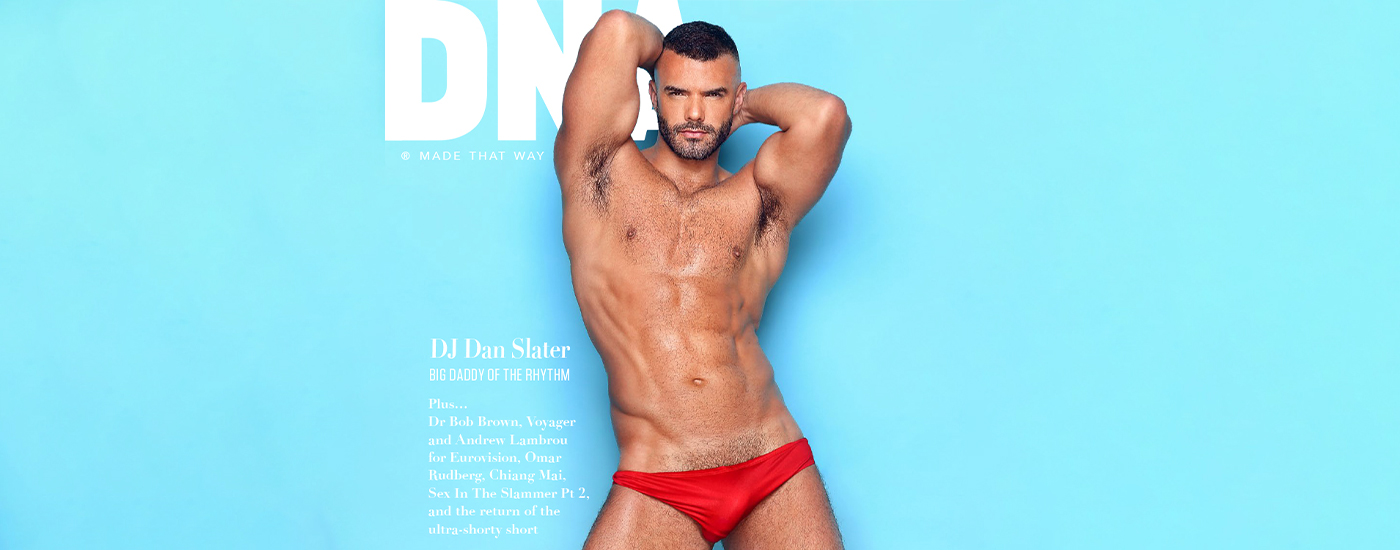Recently on Facebook, I was criticised over the kinds of models we use on the covers of DNA. Someone suggested the images are not body positive and don’t reflect the diversity of body shapes in the community. Another person added that these images can cause body dysmorphia, and another assumed all our cover models are on steroids.
To be honest, this stung. I have only ever wanted to enhance and enrich our readers’ lives with entertainment, information and beautiful images, and these comments contained assumptions, generalisations and the whiff of homophobia.
We use Photoshop to colour balance, remove blemishes and clean up the backgrounds of our photography. We don’t alter the physical shape of the models. They look the way they look. These are real people.
I spoke to Sascha, the man whose image started the conversation, and found out that he has been playing water polo since he was 14. He now regularly gyms because he’s an OnlyFans content creator. Hence his physique.
If you think DNA’s images are unrealistic or prompt an unhealthy response in those who look at them, delete Instagram immediately!
I was also uncomfortable with some of the language in the comments. The use of the term “Muscle Mary” is judgemental and homophobic: I don’t like you, so I’m going to demean you by calling you “Mary”, a homophobic slur.
Suggesting that gay men looking at pictures of healthy, attractive men triggers mental illness (body dysmorphia) is not only wrong, it is verging on homophobic. Gay men looking at pictures of other men is making them unwell?
Body dysmorphia and eating disorders are triggered by a sense of powerlessness in one’s life. It’s a physical manifestation of deep-rooted, ongoing, lifelong, psychological issues in which those suffering feel they have no control over their lives except the power to shape their bodies. It often starts in childhood. Media images are often blamed, but the actual causes are much more complex.
Everyone feels self-conscious about their body to a degree, but people who feel empowered care very little about how their body looks. We live in a patriarchy – the majority of straight men feel that no matter what their bodies look like, they still run the world and the world is there for them.
That’s not how the majority of gay men feel.
If gay men experience more body dysphoria than straight men, why could that possibly be? It’s the bullying we experience at school as kids and in the workplace as adults. It’s the social exclusion we experience. It’s the dozens of ways we self-censor every day so habitually we don’t even know we’re doing it. There’s also something called “in-group derogation” which is the overly critical judgements we experience from within our own community.
There are always cultural shifts within our community and I’m well aware of them. I’ve seen them come and they go. Some things, however, remain constant. No matter what the prevailing “community standards” – and that’s a pretty vague concept – commercial realities remain.
If we, DNA, drift away from the prevailing ideas of what a cover model should look like, we lose sales. And I’m not prepared to go out of business satisfying some vague idea about “community standards”. And I’m not prepared to stop supporting our subscribers and loyal readers by giving them something they don’t want.
We don’t decide what’s “sexy”. Our audience, collectively, makes that decision and we reflect it back. If we get it wrong, the result is poor sales and low engagement. We push the envelope where we can because we need to test the boundaries, but if I could use a wider variety of body shapes on the cover, my job would be so much easier!
People don’t complain to Vogue, “Your covers present unrealistic fashions.” That’s exactly what Vogue readers want.
What DNA is saying with our covers models is this: for those of you who like these images, here they are, please enjoy and, while you’re here, we hope you enjoy our journalism, too.
DNA proudly supports the not-for-profit organisation, Unlabelled. Their whole ethos is about being happy in your own skin. Their profits are donated to The Black Dog Institute, QLife, Headspace and Kids Help Line. You will find them in every issue of DNA. Please check them out at unlabelled.org.au
Finally, thank you to all the people on Facebook who left wonderfully supportive messages.
Andrew Creagh
Founding Editor
____________________________________________________________________________________________









